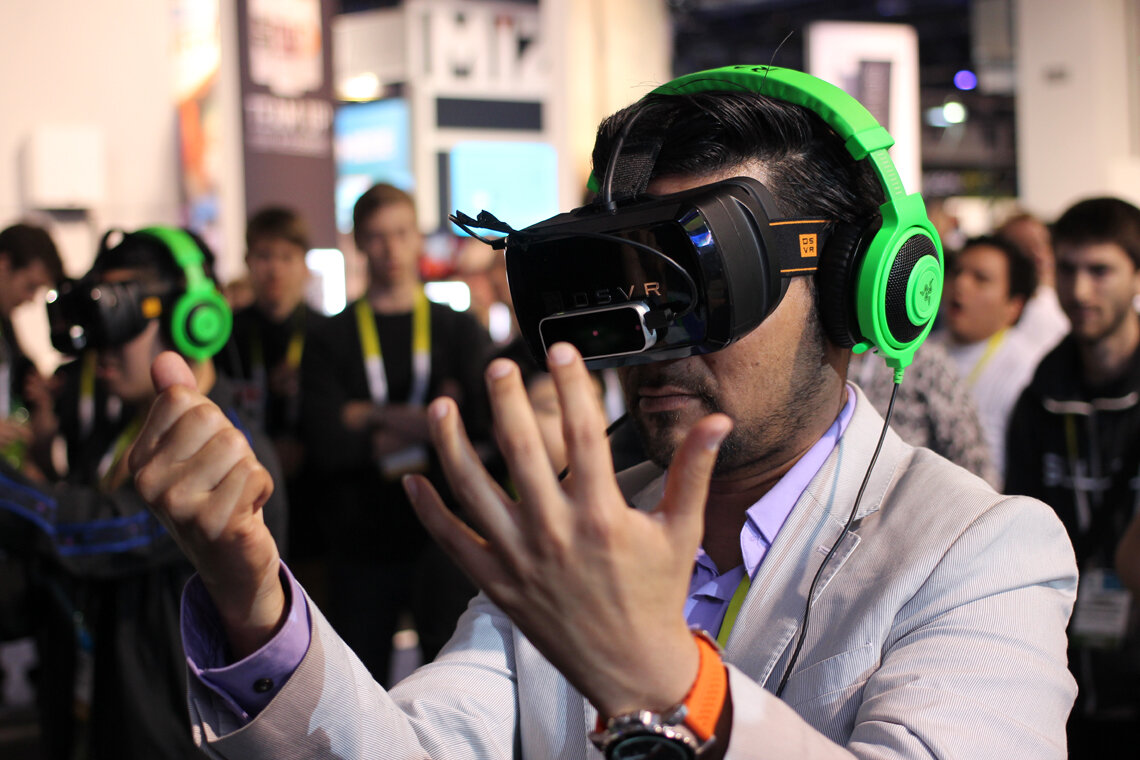We hear from Valve's Chet Faliszek about what's in store for VR gaming.
If there’s one thing that years of forward-thinking sci-fi films, TV shows and books have shown us it’s that virtual reality is a vast and exciting realm of possibilities. From Tom Cruise using his hands to manipulate the footage of crimes yet to take place in Minority Report to the Holodeck of the Star Trek universe, VR technology has always seemed unimaginable. Yet here we are with the first wave of virtual reality headsets primed for launch as we head into early 2016 and beyond – fiction has become reality. Well, almost.
“When you die in VR, you die in the real world. That’s the only thing Hollywood got right,” Valve’s Chet Faliszek jokes during his talk on some of the misconceptions about VR technology at EGX. This is typical of Chet’s style, considering we’re dealing with one of the writers on the BAFTA-winning Portal series. The room laughs, but it’s that nervous laughter where you’re still not quite sure if he’s actually telling the truth, such is the unexplored territory of VR in games.
 Maurizio Pesce
Maurizio Pesce
Even though research and development into VR has been going on for some time now, Faliszek is keen to emphasise that it is still very much in the experimental days of what is and isn’t possible. But the technical demos and micro-experiences are slowly making room for fully-fledged games such as the colossal space simulation Elite: Dangerous, which is breathtaking when partnered with a VR headset and flight stick. When asked to be more precise about what’s coming in the future, though, Faliszek is unable to offer a clear answer: “It’s so different from everything else we just don’t know,” he says. “It’s going to be out there for the community to decide.”
And that community are already far into experimenting with the technology. That’s certainly the key word when speaking to anyone currently developing for VR: experimentation. Coatsink, developers of VR puzzlers Esper and Esper 2 find themselves thrilled to be involved at such an early stage but also terrified of the possibilities. With no formula and no rules to follow they’re free to try almost anything they can put their minds too.
Similarly, nDreams, creators of exploratory VR adventure game The Assembly, are also in that position. Speaking to both George Kellion and Patrick O’Luanaigh from the developer it’s clear they have the utmost confidence in what their trying to achieve with their debut game but they know they’re still finding their footing with the tech just like everyone else. Whatever groundwork they lay with The Assembly will unquestionably serve to improve the next VR experience they create, and the next, and so on.
While there’s every reason to be excited about the potential of VR, it’s important to Faliszek that the enthusiasm the games industry has for VR doesn’t cloud its judgement, though. “Not every game makes a good VR game,” he affirms during the tail end of his talk. Still, with the HTC Vive, Oculus Rift and PlayStation VR all set to launch next year it seems no-one wants to miss the opportunity to be involved as the era of virtual reality only just begins.
Listen to our podcast for more on the world of 3D
It’s still not the most comfortable experience, however, what with the multitude of straps, cables and gizmos you need resting on your head or held in your hands at the moment. To explain why this is Faliszek has to stray into the more technical side of VR, discussing its current limitations and the advances in technology that would need to be made elsewhere before wireless headsets and full body tracking could become the norm. Certainly not yet, but maybe in the future, he clarifies.
Nevertheless, those yards of wire and weighty goggles quickly fade away. Even after multiple experiences in a virtual reality game the sense of immersion is uncanny. We’re so used to being able to turn our heads away from the screen mid-game to respond to someone, sip a drink or perform some other mundane task that the simple act of looking over your shoulder to find more of the game world surrounding you is an unsettling but awe-inspiring effect. Games have always been effective at putting the player in another world, but this is on a whole new level.
Words: James Pickard





